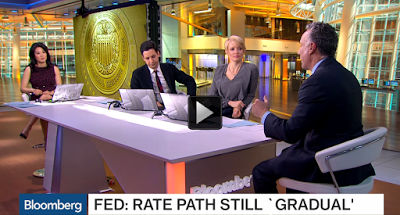Summary:
I was a guest on "What'd You Miss" on Bloomberg TV this afternoon, shortly after the markets closed. Alix Steel, Joe Weisenthal, and Scarlet Fu, and I discussed two main issues. Click here to see the seven minute clip. The first was the EU's approval, finally, of the establishment of a "bad bank" in Italy. It will ostensibly help address the bad loan problem that has been one of the factors that have prevented a stronger recovery in the third largest country in the euro area. I wrote about it here, but am disappointed with the final package. Although I do not want to put the kibosh on a program that has not even started, but I am not optimistic that it will succeed. They say camel is a horse made in committee and this seems to be a particularly apt description of the Italy's "bad bank" scheme. I fear that the compromises have so diluted the effort that the issue will have to be addressed again. I suggest that this realization may be why Italian banks sold-off on the announcement of an agreement. The second issue was the Federal Reserve. The FOMC statement had been released a couple of hours earlier. I suggest that the real news was that there wasn't any. What I mean by that is the FOMC statement, besides a few minor adjustments to its economic assessment, the general thrust and tone was little changed from December.
Topics:
Marc Chandler considers the following as important: Cool Video, Featured, FX Trends, newsletter
This could be interesting, too:
I was a guest on "What'd You Miss" on Bloomberg TV this afternoon, shortly after the markets closed. Alix Steel, Joe Weisenthal, and Scarlet Fu, and I discussed two main issues. Click here to see the seven minute clip. The first was the EU's approval, finally, of the establishment of a "bad bank" in Italy. It will ostensibly help address the bad loan problem that has been one of the factors that have prevented a stronger recovery in the third largest country in the euro area. I wrote about it here, but am disappointed with the final package. Although I do not want to put the kibosh on a program that has not even started, but I am not optimistic that it will succeed. They say camel is a horse made in committee and this seems to be a particularly apt description of the Italy's "bad bank" scheme. I fear that the compromises have so diluted the effort that the issue will have to be addressed again. I suggest that this realization may be why Italian banks sold-off on the announcement of an agreement. The second issue was the Federal Reserve. The FOMC statement had been released a couple of hours earlier. I suggest that the real news was that there wasn't any. What I mean by that is the FOMC statement, besides a few minor adjustments to its economic assessment, the general thrust and tone was little changed from December.
Topics:
Marc Chandler considers the following as important: Cool Video, Featured, FX Trends, newsletter
This could be interesting, too:
Eamonn Sheridan writes CHF traders note – Two Swiss National Bank speakers due Thursday, November 21
Charles Hugh Smith writes How Do We Fix the Collapse of Quality?
Marc Chandler writes Sterling and Gilts Pressed Lower by Firmer CPI
Michael Lebowitz writes Trump Tariffs Are Inflationary Claim The Experts

I was a guest on "What'd You Miss" on Bloomberg TV this afternoon, shortly after the markets closed. Alix Steel, Joe Weisenthal, and Scarlet Fu, and I discussed two main issues. Click here to see the seven minute clip.
The first was the EU's approval, finally, of the establishment of a "bad bank" in Italy. It will ostensibly help address the bad loan problem that has been one of the factors that have prevented a stronger recovery in the third largest country in the euro area.
I wrote about it here, but am disappointed with the final package. Although I do not want to put the kibosh on a program that has not even started, but I am not optimistic that it will succeed. They say camel is a horse made in committee and this seems to be a particularly apt description of the Italy's "bad bank" scheme. I fear that the compromises have so diluted the effort that the issue will have to be addressed again. I suggest that this realization may be why Italian banks sold-off on the announcement of an agreement.
The second issue was the Federal Reserve. The FOMC statement had been released a couple of hours earlier. I suggest that the real news was that there wasn't any. What I mean by that is the FOMC statement, besides a few minor adjustments to its economic assessment, the general thrust and tone was little changed from December. There was no heightened sensitivity to the market turmoil or the further fall in oil prices. Nor did the FOMC statement show any recognition that the US economy nearly stagnated in Q4 15.
Many observers had expected a dovish tone. It was not. It was not hawkish. It was essentially that same forward guidance that it previously delivered. Judging from the March Fed Funds futures, the market does not expect a rate hike in March.
